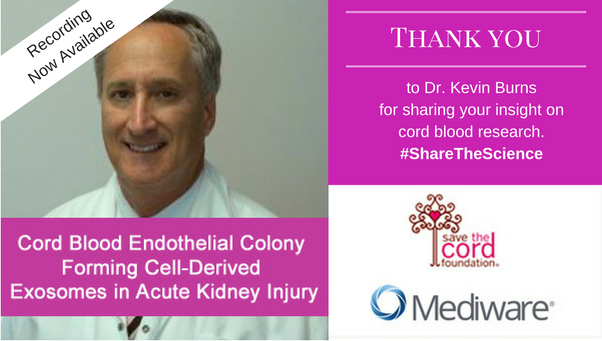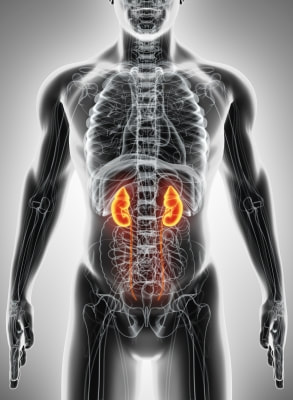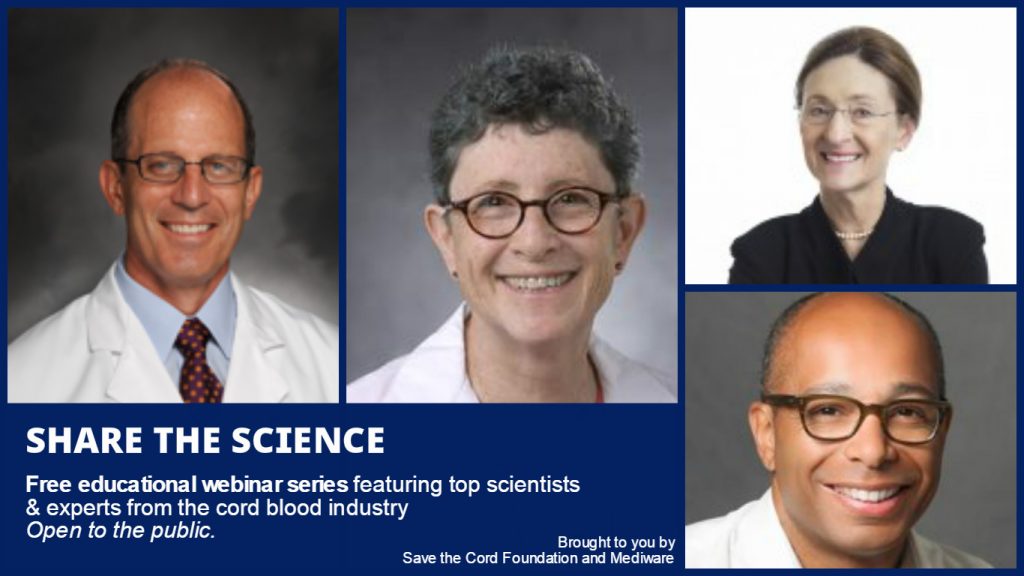|
Share the Science: Dr. Kevin Burns, Treating Acute Kidney Injury RECORDING COMING SOON: Acute kidney injury (AKI) is incredibly common, affecting as many as 20% of hospitalized patients according to the National Kidney Foundation. Sadly, despite years of research, doctors have not found an effective treatment for acute kidney injury. As a result, mortality rates remain high at 1-5% of hospitalized patients. However, the research of Dr. Kevin D. Burns from the Ottawa Hospital Research Institute is providing new hope for patients and cord blood may be the key. Save the Cord Foundation and Mediware, Inc. are proud to welcome Dr. Kevin Burns to speak about his research on the next edition of our popular webinar series, Share the Science (learn more about the series here). A professor of medicine in the division of Nephrology at the Department of Medicine of the Ottawa Hospital and University of Ottawa, Dr. Burns has dedicated his career to kidney research.
Share the Science with Dr. Kevin D. Burns “Cord Blood Endothelial Colony Forming Cell-Derived Exosomes in Acute Kidney Injury” Wednesday, September 20, 2017 at 3-4pm Central Time Free to register. Open to the public. Recommended reading: https://www.ncbi.nlm.nih.gov/pubmed/26073035 During the webinar, attendees will learn about:
About Kevin D. Burns MD, CM, FRCP(C): Dr. Burns is a professor of medicine in the division of Nephrology at the Department of Medicine of the Ottawa Hospital and University of Ottawa. He is senior scientist and director of the Kidney Research Centre of the Ottawa Hospital Research Institute and is cross-appointed to the Department of Cellular and Molecular Medicine. Dr. Burns’ research has focused on the function and regulation of the intrarenal renin-angiotensin system in diabetic nephropathy and hypertension and the pathogenesis and treatment of acute kidney injury. He received his BSc and MD degrees from McGill University and completed internal medicine residency and clinical nephrology fellowship training at the University of Ottawa. Dr. Burns also undertook basic science research training at Vanderbilt University Medical Center. His laboratory has been supported by funds from the Canadian Institutes of Health Research, the Kidney Foundation of Canada, and the Canada Foundation for Innovation/Ontario Innovation Trust. Dr. Burns is past president of the Canadian Society of Nephrology and is chair of the steering committee for the KRESCENT Program, a national kidney research training program launched by the Canadian Society of Nephrology, the Kidney Foundation of Canada, and the Canada foundation for Innovation/Ontario Innovation Trust. In 2010, Dr. Burns received the Medal for Research Excellence from the Kidney Foundation of Canada in recognition of his contributions to kidney research in Canada. To learn more about the KRESCENT program, please click here. We wish to thank Dr. Kevin Burns for sharing his valuable insight on cord blood and kidney research with our Share the Science community. We also wish to thank Mediware, Inc. for their generous support making this webinar possible. Share the Science continues to be a popular series within the cord blood community and beyond. We welcome your input on the series and suggestions for future speakers. Give your feedback here. Previous Share the Science presentations have been archived for your reference. Discover the work of leading scientists and cord blood industry experts through this educational series. View the archive now.
Share the Science is made possible thanks to the generous support of Mediware, Inc. |
AuthorWrite something about yourself. No need to be fancy, just an overview. Archives
December 2023
Categories |





 RSS Feed
RSS Feed


